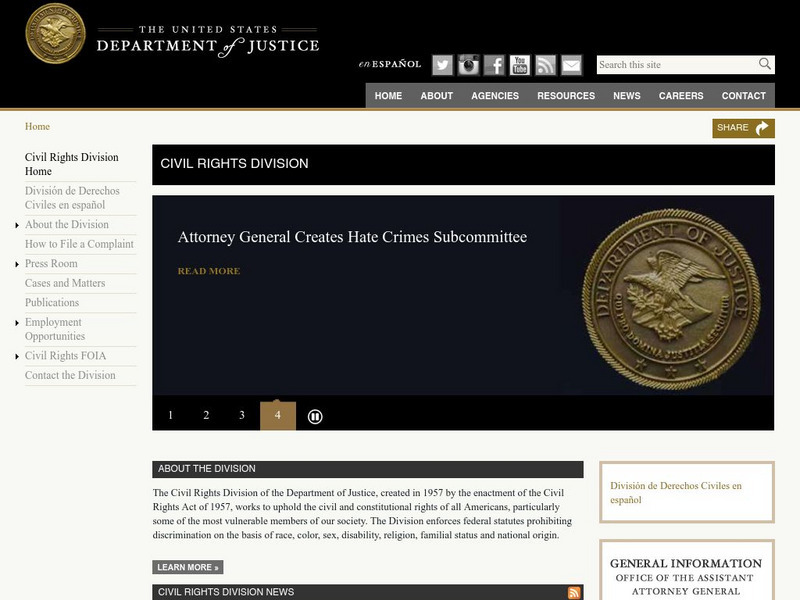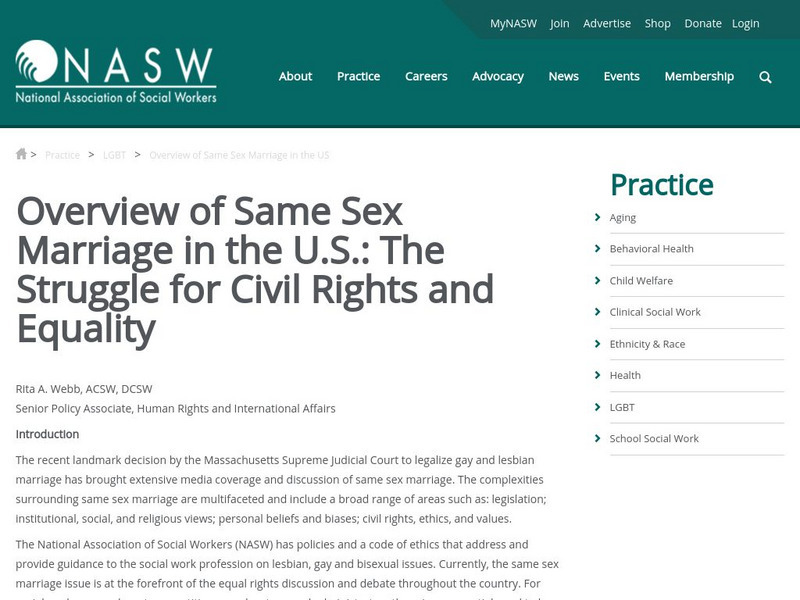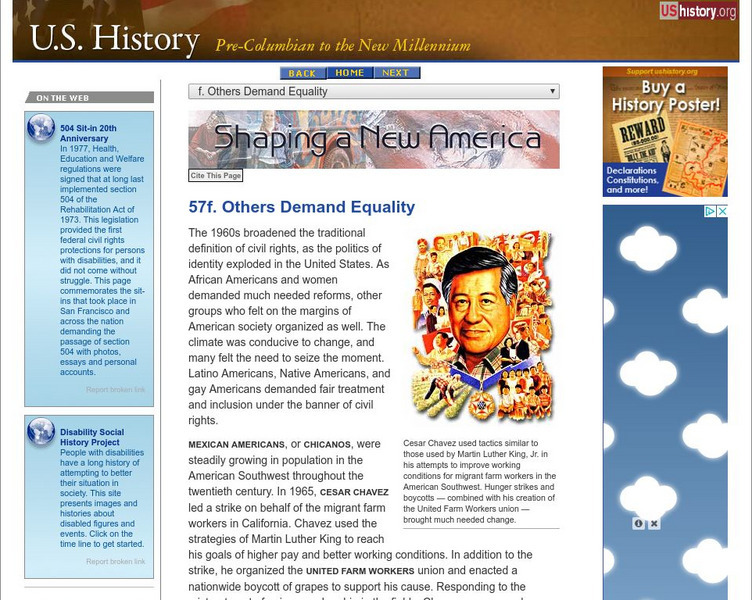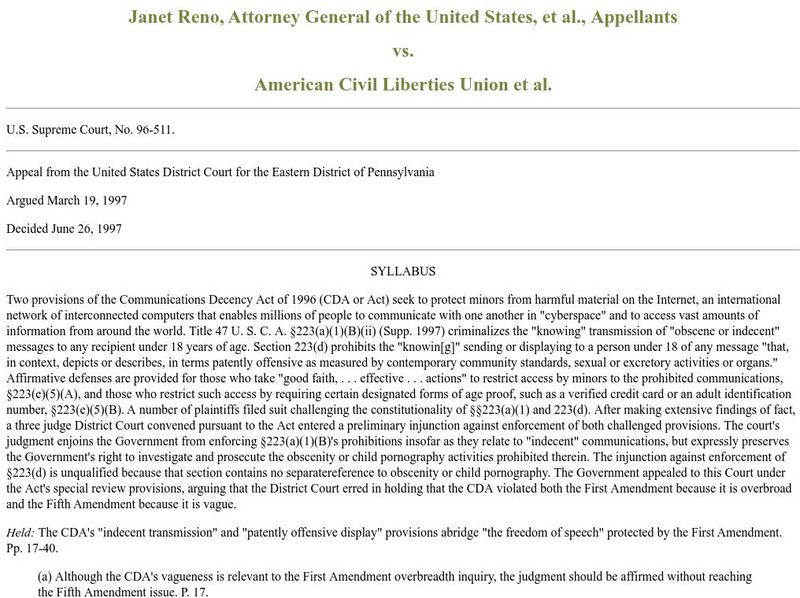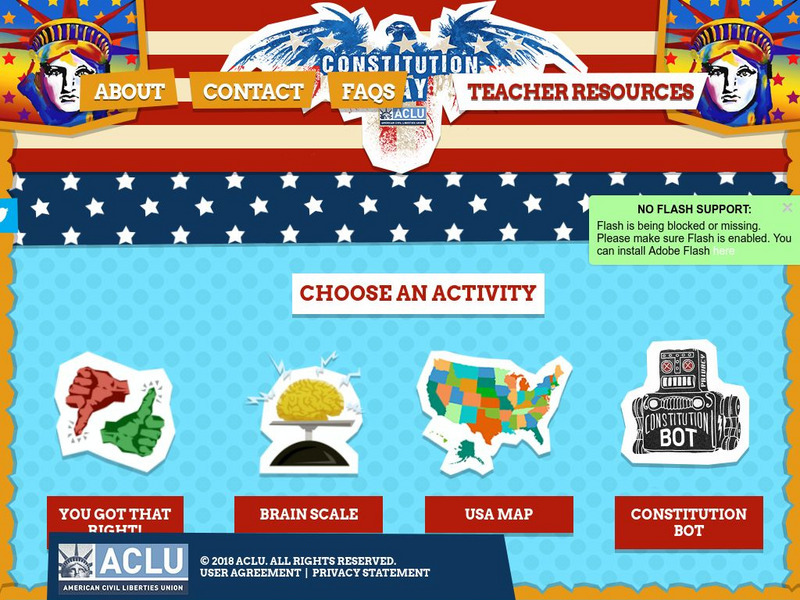Curated OER
Lincoln-Douglas Debates of 1858
High schoolers examine the transcripts of the 1858 Lincoln-Douglas debates and create a platform for each candidate in the 1858 Senate race. They utilize the candidates' arguments to explore the historical and political impact.
PBS
Pbs Learning Media: Civil Rights Special Collection
Multimedia collection of video, primary text documents and audio on Civil Rights, especially Brown vs. Board of Education.
US National Archives
Docsteach: From Dred Scott to Civil Rights Act of 1875: Eighteen Years of Change
In 1857, the U.S. Supreme Court ruled in the Dred Scott decision that African-Americans were not citizens of the United States. Yet within 18 years, Black Americans would not only have citizenship, but would be guaranteed the right to...
Annenberg Foundation
Annenberg Classroom: Civil Liberties in War
This resource provides extensive information for students and teachers examining the issue of civil liberty during wartime and in the fight against terrorism in the U.S. following September 11. Resources include news articles, legal...
Annenberg Foundation
Annenberg Learner: Democracy in America: Civil Rights: Demanding Equality
This unit embraces those individuals who have brought change to the United States in both social and political equality through a Video on Demand, activities, and other enlightening resources.
US Department of Justice
U.s. Department of Justice: Civil Rights Division
Read press releases and reports related to civil rights issues, news, and events.
US Department of State
U.s. Department of State: Decades of Change: 1960 1980
Summary of the rise of cultural and ethnic pluralism that took place in America between 1960 -1980 causing major social change. Included were such movements as civil rights, women, Latino, Native-American, counterculture,...
Stanford University
Mlk and the Global Freedom Struggle: Civil Rights Act of 1964
Read about President John F. Kennedy's role in attempting to outlaw segregation, and, after Kennedy's assassination, President Johnson's role in making that happen with the passage of the Civil Rights Act of 1964.
US Government Publishing Office
Ben's Guide to u.s. Government: Rights of Citizens: The Bill of Rights
This site provides a full-text version of the Bill of Rights, the document that secures and protects individual, political and economic freedoms.
PBS
Pbs Learning Media: Fannie Lou Hamer Civil Rights Movement in Rural Mississippi
A collection that uses primary sources to explore Fannie Lou Hamer and the civil rights movement in rural Mississippi.
Black Past
Black Past: Civil Rights Congress (1946 1956)
This encyclopedia entry talks about the Civil Rights Congress, a group that gave legal defense for blacks, but was hampered by its support of the Communist Party during the Cold War.
National Association of Social Workers
Nasw: Overview of Same Sex Marriage in the u.s.
The struggle for civil rights and equality in the United States when it comes to legalization of same sex marriage is presented in a report by the National Association of Social Workers. Identify the ethics, domestic union and...
Independence Hall Association
U.s. History: Others Demand Equality
Many other groups learned how to push for their civil rights from African Americans' civil rights movement. Read about the Mexican Americans, Native Americans, and gays as they worked to achieve equal treatment under the law.
Other
Janet Reno vs. American Civil Liberties Union
A complete transcript outlining the court case between Janet Reno, U.S. Attorney General, and the American Civil Liberties Union, in which the Communications Decency Act was declared unconstitutional.
Northern Illinois University
Illinois Periodicals Online: Everett Dirksen and the 1964 Civil Rights Act
Read about the use of the filibuster in the U.S. Senate as a way to control legislation.In the discussion of the Civil Rights Act of 1964, the longest filibuster in history was launched as a way to keep the legislation from coming to a...
Other
Encyclopedia Virginia: Civil Rights Act of 1964
A detailed look at the Civil Rights Act of 1964, paying particular attention to how Virginia Representative Howard W. Smith added an amendment intended to kill the act by making it cover gender discrimination as well as racial. Read...
PBS
Pbs News Hour: Your Safety and Security or Your Civil Liberties Lesson
The object of this lesson plan is to take a look at the USA Patriot Act and the controversies around the Act. Does the Patriot Act defy our Civil Liberties? This lesson plan will explore that question and more.
Other
Us Eeoc: Title Vii of the Civil Rights Act of 1964
Title VII of the Civil Rights Act of 1964 provided important protection for fairness in employment by establishing the Equal Employment Opportunity Commission. Read the text of that legislation here, and see how it protects workers on...
Other
American Civil Liberties Union: Constitution Day Activities
Six activities teach students about the U.S. Constitution. Learn about checks and balances, the Bill of Rights, some of the history of the document, and how each of the states became a state. The site also provides teacher resources,...
US Department of Justice
U.s. Department of Justice: Webb v. Clyde L. Choate Mental Health Center [Pdf]
Although specifically a case in which the plaintiff is seeking federal support under the ADA against Illinois, there is an excellent discussion of state v. federal powers in the section labeled "Summary of Argument." The connection to...
US House of Representatives
History, Art, and Archives: The Civil Rights Act of 1957
Read about the role of President Eisenhower in the impetus for the support of civil rights in 1957.
University of Virginia
Miller Center at Uva: u.s. Presidents: Dwight Eisenhower: Domestic Affairs
President Eisenhower tried to follow a middle road in proposing and supporting domestic affairs during his presidency. Read about the policies he put forward. Read also about his dealing with Senator Joseph McCarthy, and his spotty...
Independence Hall Association
U.s. History: Martin Luther King, Jr.
A brief biography of civil rights hero, Martin Luther King, Jr. This article touches on his early life, but focuses on his actions as a leader of nonviolent change to bring equality to African Americans. Find a speech given by Robert...
University of Virginia
Miller Center at Uva: u.s. Presidents: Lyndon Baines Johnson
Explore the life and times of Lyndon Baines Johnson (1908-1973 CE)through AmericanPresident.org. Find out about the 36th president and his accomplishments during his presidency. He was a teacher early in his career.




